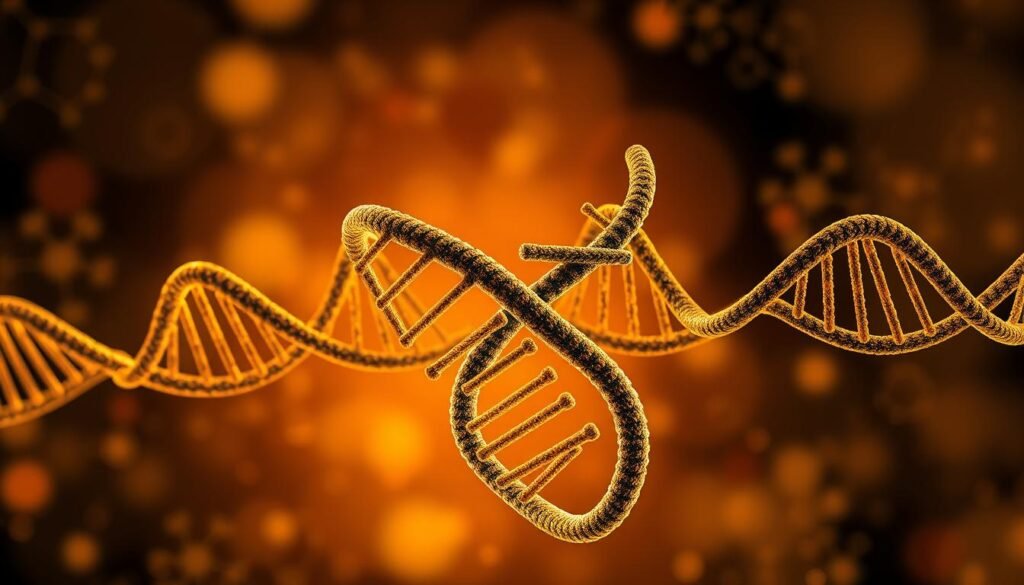I’ve often wondered why losing weight feels like an uphill battle. Despite my best efforts with diet and exercise, the scale doesn’t always reflect the hard work. It’s not just about willpower—there’s a lot more going on beneath the surface.
Scientific research shows that factors like cellular metabolism and environmental exposures play a significant role in weight management. For example, exposure to certain chemicals can disrupt our body’s natural processes, making it harder to maintain a healthy weight1. These challenges are not just personal; they’re widespread, with 40% of adults in the U.S. facing obesity2.
Even after significant weight loss, studies indicate that the number of fat cells in the body remains stable, which can make long-term maintenance difficult3. This isn’t just about numbers on a scale—it’s about understanding the science behind why our bodies resist change.
In this article, we’ll explore the latest research, the limitations of traditional methods, and strategies that could help you achieve lasting results. It’s time to look beyond the surface and understand the real reasons behind the struggle.
Key Takeaways
- Weight management is influenced by both lifestyle and biological factors.
- Environmental exposures, like certain chemicals, can disrupt metabolism.
- 40% of adults in the U.S. struggle with obesity2.
- Fat cell numbers remain stable even after weight loss3.
- Understanding the science behind weight struggles is key to long-term success.
The Complex Science Behind the Struggle
Weight loss isn’t just about calories—it’s about how our bodies function. Many factors, from environmental exposures to cellular processes, play a role in this complex system. Understanding these elements can help us tackle the challenges more effectively.
Impact of Forever Chemicals on Metabolism
Industrial chemicals like PFOS and PFOA, often called “forever chemicals,” accumulate in our environment and bodies over time. These substances disrupt cellular respiration, reducing ATP production at the cellular level4. This interference with our energy systems can lead to weight gain, even with regular exercise.
Research from Clemson’s lab shows that these chemicals confuse enzymes and receptors, blocking normal energy flow4. As a result, our metabolism slows down, making it harder to burn calories efficiently. This breakdown at one level affects the entire system, leading to adverse results5.
Cellular Energy Production and Weight Gain
Our cells rely on ATP for energy, but disruptions in this process can have significant consequences. When ATP production is hindered, our bodies store more energy as fat instead of using it4. This imbalance is a key part of why weight management feels so challenging.
“The disruption of metabolic processes by environmental chemicals is a major contributor to weight gain,” says a recent study6.
Even with consistent exercise, the body’s ability to produce energy efficiently is compromised. This highlights the importance of addressing both lifestyle and biological factors in weight management. Here’s what you need to know:
- Forever chemicals disrupt cellular respiration and ATP production.
- Reduced energy flow leads to slower metabolism and weight gain.
- Regular exercise becomes less effective due to these disruptions.
By understanding these scientific principles, we can develop better strategies to support our health and achieve lasting results.
Why Traditional Diet and Exercise Fall Short
Many people find that traditional weight loss methods don’t deliver lasting results. Despite the common advice to “eat less and move more,” studies show that only 1% of individuals achieve long-term success with this approach7. This raises the question: why do so many struggle to keep the weight off despite their best efforts?

Limitations of Conventional Calorie Restriction
Calorie restriction often leads to temporary weight loss, but it rarely results in lasting change. Research from King’s College highlights that over one-third of lost weight tends to return within the first year7. This is because the body adapts to reduced energy intake, slowing metabolism and increasing hunger signals.
For many, this creates a frustrating cycle of loss and regain. The brain’s survival mechanisms make it easier for weight to rebound than to stay off8. This biological response is a key reason why traditional diets often fail.
Understanding the 1% Success Rate in Weight Loss
Nerd Fitness points out that the simplicity of “eat less, move more” overlooks the complexity of weight management. Factors like hormonal imbalances, metabolic adaptations, and environmental influences play a significant role9. For example, lower fat diets may increase energy expenditure by 26 kcal/d, but this is often offset by other biological changes9.
This multidimensional process explains why so many people, despite hard work and commitment, experience plateaus or reversals in their progress. The reality is, weight loss and gain are influenced by more than just calorie counting.
“The disruption of metabolic processes by environmental chemicals is a major contributor to weight gain,” says a recent study9.
Being a person trying to lose weight in today’s environment is more challenging than ever. The obesogenic nature of modern life, combined with biological factors, makes sustained weight loss a complex goal. To achieve lasting results, we need strategies that go beyond traditional methods and address these deeper issues.
Overcoming fat forever: A Tailored Weight Loss Strategy
Personalized strategies are reshaping the way we approach weight loss. Traditional, one-size-fits-all diets often fail because they don’t account for individual differences. To achieve lasting results, it’s essential to understand your unique body and habits.

Adopting a Personalized Approach to Weight Management
Studies show that tailored weight loss plans are more effective in the long term10. For example, a personalized approach considers factors like metabolism, food preferences, and activity levels. This way, you’re not just following a generic plan but creating one that works for you.
Understanding how your body reacts to different foods and activities is key. Research highlights that sustainable weight loss is a gradual process, emphasizing consistency over perfection10. By focusing on your unique needs, you can avoid the common problem of weight regain.
“A tailored weight loss plan increases the likelihood of adherence to the program in the long term,” according to recent findings10.
Here’s how you can start:
- Identify foods that fuel your body without causing energy crashes.
- Incorporate activities you enjoy to stay consistent.
- Track your progress and adjust your plan as needed.
This approach not only helps in losing weight but also ensures you maintain it. By addressing both biology and lifestyle, you’re setting yourself up for success in a way that traditional methods often fail to deliver.
Harnessing Hormone Balance and Metabolic Health
Understanding how hormones influence weight management can unlock new strategies for success. Hormones like insulin, cortisol, and thyroid hormones play a critical role in how our bodies process energy and store weight. When these hormones are out of balance, it can lead to significant issues in maintaining a healthy weight11.

For example, insulin, secreted by the pancreas, helps regulate blood sugar levels. However, chronically high insulin levels can promote fat storage, especially when combined with a caloric surplus11. Similarly, cortisol, often called the stress hormone, can lead to increased fat storage around the abdomen11. These hormonal imbalances highlight why traditional methods like eating less and exercising more may not always work.
The Role of Thyroid and Other Key Hormones
The thyroid gland is a key player in metabolic health. It produces hormones like T3, which regulate resting metabolic rate11. When thyroid hormone levels are inadequate, it can slow metabolism, making weight loss extremely challenging. This is why getting a complete lab panel to identify thyroid-related issues is essential11.
Other hormones, like leptin and ghrelin, also influence weight management. Leptin signals fullness, while ghrelin stimulates hunger. An imbalance in these hormones can lead to overeating and hinder weight loss efforts11. Addressing these imbalances through targeted strategies can make a significant difference.
Optimizing Your Resting Metabolic Rate
Your resting metabolic rate (RMR) determines how many calories your body burns at rest. Factors like age, muscle mass, and hormonal balance all influence RMR12. For example, muscle burns more calories than fat, so increasing lean muscle mass can boost metabolism12.
Small changes based on lab results can lead to significant improvements over time. For instance, addressing thyroid dysfunction or managing stress to lower cortisol levels can optimize RMR11. Here’s a quick list of strategies to consider:
- Get a comprehensive lab panel to identify hormonal imbalances.
- Incorporate strength training to build muscle and boost metabolism.
- Manage stress through mindfulness or relaxation techniques.
- Ensure adequate sleep to support hormonal balance.
| Hormone | Role in Weight Management | Actionable Steps |
|---|---|---|
| Insulin | Regulates blood sugar; high levels promote fat storage | Reduce refined carbs; eat balanced meals |
| Cortisol | Stress hormone; increases abdominal fat | Practice stress management; prioritize sleep |
| Thyroid Hormones | Regulate metabolism; low levels slow RMR | Get thyroid tested; consider supplementation if needed |
By addressing hormonal imbalances and optimizing your resting metabolic rate, you can create a more effective weight management strategy. These changes, combined with a supportive environment, can lead to lasting results12.
Practical How-To Steps for Lasting Weight Loss
Achieving lasting weight loss requires more than just willpower—it’s about building habits that stick. Small, consistent changes in your daily life can lead to significant results over time. Here’s how you can create a routine that supports your goals and keeps you on track.

Building Sustainable Habits and Routines
Start by identifying habits that align with your advice and lifestyle. For example, incorporating strength training for at least 4 weeks can reduce body fat by an average of 1.46%13. Pair this with a diet rich in protein, aiming for 10% to 35% of your daily calories from protein13.
Sleep is another critical factor. Getting less than 6 hours of sleep is linked to higher visceral fat levels, while 7 hours or more supports metabolic health13. Prioritize rest to optimize your metabolism and energy levels.
Here’s a quick list of habits to consider:
- Engage in regular aerobic exercise to reduce waist circumference13.
- Focus on whole grains and fiber, which promote weight loss13.
- Practice mindful eating to avoid overconsumption.
Creating an Environment That Supports Healthy Choices
Your surroundings play a significant role in your success. For instance, reducing sugar-sweetened beverages can lower BMI levels13. Replace them with water or unsweetened alternatives to support your goals.
Meal timing also matters. Eating more calories earlier in the day and fewer at dinner can aid in weight loss14. This simple shift can make a big difference in your state of health.
“Sustainable weight loss is about consistency, not perfection,” says a recent study13.
For women, focusing on routines that fit into daily life is key. Walking for 60 minutes a day, as recommended by the National Weight Control Registry, can help maintain weight loss14. Combine this with strength training for even better results.
Here’s how to build a supportive environment:
- Keep healthy snacks readily available.
- Set reminders for regular physical activity.
- Track progress weekly to stay motivated.
By making these small changes, you can create a life that supports your weight loss goals. Remember, it’s not about doing something drastic—it’s about consistency and sustainability.
Using Additional Tools and Modern Therapies
Modern tools and therapies are revolutionizing how we approach weight management. From advanced lab tests to FDA-approved treatments, these innovations empower patients to take control of their health. By understanding your body’s unique needs, you can create a tailored plan that works for you.

One key element in this process is leveraging lab tests to monitor health markers. For example, tracking insulin levels can reveal how your body processes carbohydrates. Studies show that low-carb diets, with less than 50 g/day of carbs, can significantly improve blood sugar levels and cholesterol profiles15. This data helps patients make informed decisions about their diet and lifestyle.
Leveraging Lab Tests and Monitoring Health Markers
Lab tests provide a clear picture of your metabolic health. For instance, fasting glucose levels dropped from 7.5 to 6.3 mmol/l in obese individuals following a low-carb diet15. These markers are essential for tracking progress and adjusting your plan as needed.
Following a structured order when incorporating new therapies is equally important. Start with basic tests like blood sugar and cholesterol levels. Then, explore advanced options like hormone panels to identify imbalances. This step-by-step process ensures you address all aspects of your health.
“Monitoring health markers is the foundation of personalized treatment,” says a recent study15.
Innovative treatments, such as FDA-approved medications, have shown promising results. For example, a 56-week study on a ketogenic diet led to significant improvements in cholesterol and triglyceride levels15. These therapies, combined with regular monitoring, can lead to long-term success.
Your brain also plays a critical role in this journey. A positive mindset and clear goals help sustain progress. By focusing on both mental and physical elements, you can create a well-rounded approach to weight management.
- Use lab tests to track key health markers like blood sugar and cholesterol.
- Follow a structured order when incorporating new therapies.
- Explore FDA-approved treatments for additional support.
- Maintain a positive mindset to sustain long-term success.
By embracing these modern tools and therapies, you can take a proactive approach to your health. This process not only helps you achieve your goals but also ensures you maintain them for the long term.
Conclusion
Understanding the science behind weight management can transform how we approach health goals. Achieving and maintaining a normal weight isn’t just about willpower—it’s about addressing the right factors and using the tools available in today’s market.
Throughout this article, we’ve explored how hormonal balance, personalized strategies, and modern therapies play a critical role. For instance, comprehensive lab tests can reveal imbalances that make weight loss challenging16. By understanding these factors, you can create a plan tailored to your unique needs.
It’s essential to work persistently and make smart choices. Whether it’s adjusting your diet to eat more nutrient-dense foods or incorporating regular exercise, every step counts. Remember, sustainable results come from consistency and leveraging all available resources.
Take the first step by reflecting on your journey and considering a full health test. With the right approach, you can achieve lasting success and a healthier life.
FAQ
Why is it so hard to maintain a healthy weight long-term?
How do “forever chemicals” affect my metabolism?
Why doesn’t traditional diet and exercise always work?
What is the 1% success rate in weight loss?
How can I adopt a personalized weight management approach?
What role do hormones like thyroid play in weight management?
How can I optimize my resting metabolic rate?
What are practical steps for lasting weight loss?
How can lab tests help in weight management?
Source Links
- https://www.drchristophernewman.com/blog/are-fat-cells-forever/
- https://www.webmd.com/obesity/features/are-you-fated-be-fat
- https://www.nih.gov/news-events/nih-research-matters/fat-cell-numbers-teen-years-linger-lifetime
- https://www.npr.org/2019/04/25/717058877/the-biology-of-weight-loss
- https://pmc.ncbi.nlm.nih.gov/articles/PMC5764193/
- https://seek.rockefeller.edu/will-science-end-obesity/
- https://pmc.ncbi.nlm.nih.gov/articles/PMC3174765/
- https://www.npr.org/sections/thesalt/2016/06/07/481094825/a-neuroscientist-tackles-why-diets-make-us-fat
- https://pmc.ncbi.nlm.nih.gov/articles/PMC5568065/
- https://foreverweightlossstl.com/how-to-lose-weight-fast-scientific-and-sustainable-tips/
- https://tailoredcoachingmethod.com/hormones-influence-fat-loss-and-muscle-growth/
- https://www.houstonmethodist.org/blog/articles/2023/oct/how-to-boost-your-metabolism/
- https://www.healthline.com/nutrition/best-ways-to-burn-fat
- https://www.helpguide.org/wellness/weight-loss/how-to-lose-weight-and-keep-it-off
- https://pmc.ncbi.nlm.nih.gov/articles/PMC3826507/
- https://www.restartmed.com/destined-to-be-overweight-forever/?srsltid=AfmBOoopgixjI7hMTjBZSvU19XLfNb5PkHWUcxTdqKDTmtfkqBhzD171





